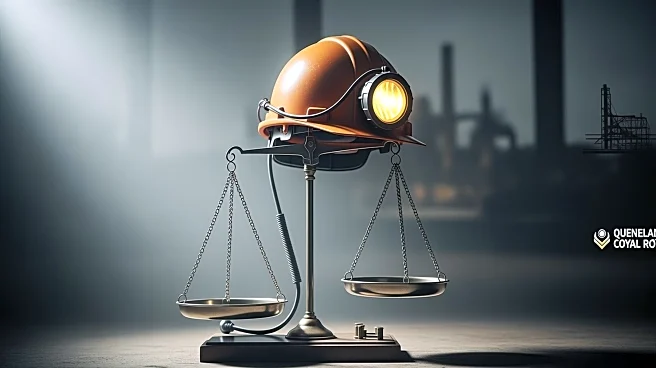What's Happening?
BHP, Australia's most valuable mining company, has alerted shareholders that the current coal royalties regime in Queensland could lead to significant job losses. The company has already decided to mothball the Saraji South metallurgical coal mine, which
will result in the loss of approximately 750 jobs. BHP CEO Mike Henry highlighted that the company is paying 67 cents on every dollar in taxes and royalties, a situation he described as unsustainable. The tiered royalty scheme in Queensland imposes levies ranging from seven percent to 40 percent based on coal prices. Despite calls for change, Premier David Crisafulli has refused to alter the scheme, criticizing mining companies for blaming royalties for job cuts.
Why It's Important?
The situation underscores the tension between government policies and corporate sustainability in the mining sector. The high tax and royalty rates could deter investment in Australia, impacting regional economies and employment. BHP's decision to mothball mines reflects broader challenges in maintaining profitability amid fluctuating coal prices and stringent fiscal policies. The potential job losses could have significant socio-economic repercussions for communities reliant on mining jobs. Additionally, the Productivity Commission's proposal to lower the corporate tax rate from 30 percent to 20 percent could influence future policy decisions, aiming to make Australia more competitive in attracting global investment.
What's Next?
BHP's decision to place Saraji South under care and maintenance is set for November, with potential for reopening if economic conditions improve. The ongoing negotiations with Chinese steelmakers over iron-ore shipments could also impact BHP's operations and profitability. The mining industry will be closely monitoring any government response to the Productivity Commission's tax rate proposal, which could reshape the fiscal landscape for mining companies. Stakeholders, including regional communities and industry leaders, may advocate for policy changes to balance economic growth with sustainable taxation.
Beyond the Headlines
The broader implications of BHP's situation highlight the challenges of balancing environmental policies with economic growth. The high royalties are part of efforts to manage resource extraction sustainably, but they also risk stifling industry growth and innovation. The debate over corporate tax rates and royalties could influence future discussions on how to best support industries critical to Australia's economy while ensuring fair contributions to public finances.
















